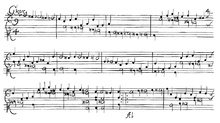Johann Paul von Westhoff
Johann Paul von Westhoff (* 1656 in Dresden ; buried April 17, 1705 in Weimar ) was a German composer and violinist.
Life
Johann Paul von Westhoff was the son of the Rittmeister, lutenist and trombonist Friedrich von Westhoff, originally from Lübeck . Because of his special talent for languages, Westhoff became an informator for the Saxon princes in 1671. Three years later he was accepted into the Dresden court orchestra at a salary of 400 guilders . From the same year he was a language teacher for the Saxon princes Johann Georg and Friedrich August for Italian, French and Spanish. In 1679 he traveled to Sweden and the Baltic States. As an ensign in the life guard of General Graf von Schulz, he participated in the fight against the Kuruc uprising under Emmerich Thököly in 1680 . At the behest of the elector, Westhoff resigned in the same year. Between 1684 and 1697 he undertook several art trips that took him to Italy, France, Lower Germany, the southern Netherlands (Brabant and Flanders) and England. In 1782 he played in Paris in front of the French King Louis XVI. , here two of his sonatas appeared, which were published in the Mercure Galant . In Vienna the Emperor awarded him a golden chain of mercy for his musical merits. Johann Gottfried Walther wrote about the trips :
“... where he was not only acquainted with the most famous, learned people and virtuosos, but also with the Grand Duke of Florence, and kings in France were pardoned with handsome gifts, also afterwards in 1684 at the Kayserl. Court happens as if a gold chain was hung on him. "
After August the Strong converted to Catholicism, Westhoff taught newer languages at the University of Wittenberg . In 1699 he came to the court of Weimar as chamber secretary, chamber musician and language master for French and Italian.
Works
During his lifetime, Westhoff was one of the leading violinists in the German-speaking world, along with Heinrich Ignaz Franz Biber and Johann Jakob Walther . His style is influenced by that of the somewhat older Walther, with whom he worked for several years in the Dresden court orchestra.
Four of his collections have survived:
- The first dozen Allemanden, Couranten, Sarabanden and Giguen (Dresden 1682) are missing.
- The ones published galant in the Mercure are a sonata for violin and basso continuo (December 1682) and a five-movement suite pour le violon seul sans basse (January 1683).
- In 1694 a collection of six sonatas for violin and basso continuo was published in Dresden
- 1696 one of six suites for violin solo, also in Dresden. In the suites in particular, the limits for polyphonic violin playing until then were explored. Since Westhoff was concertmaster like Johann Sebastian Bach at the court of Saxony-Weimar for several years and the latter consequently had to know Westhoff's work, the suites for violin without bass from 1696 are considered to be important forerunners of the similar sonatas and partitas by Bach.
literature
- Friedrich Frick: Small Biographical Lexicon of Violinists: From the beginning of violin playing to the beginning of the 20th century. BoD - Books on Demand, 2009, ISBN 978-3-8370-3907-8 , p. 567 ( limited preview in Google book search).
- Kai Köpp: Westhoff, Johann Paul von. In: Ludwig Finscher (Hrsg.): The music in past and present . Second edition, personal section, volume 17 (Vina - Zykan). Bärenreiter / Metzler, Kassel et al. 2007, ISBN 978-3-7618-1137-5 , Sp. 832-833 ( online edition , subscription required for full access)
Web links
- Sheet music and audio files by Johann Paul von Westhoff in the International Music Score Library Project
- Works by and about Johann Paul von Westhoff in the catalog of the German National Library
- Presentation of the recording of the violin sonatas with David Plantier on Deutschlandfunk
Individual evidence
- ^ Johann Gottfried Walther : Musicalisches Lexicon or Musicalische Bibliothec. Wolffgang Deer, Leipzig 1732, pp. 649-650 ( Textarchiv - Internet Archive ).
- ↑ a b Bernhard Moosbauer: Johann Sebastian Bach - Sonatas and Partitas for Solo Violin . Bärenreiter, Kassel etc. 2015, ISBN 978-3-7618-2220-3 .
- ^ Kai Köpp: Westhoff, Johann Paul von. In: Ludwig Finscher (Hrsg.): The music in past and present . Second edition, personal section, volume 17 (Vina - Zykan). Bärenreiter / Metzler, Kassel et al. 2007, ISBN 978-3-7618-1137-5 , Sp. 832-833 ( online edition , subscription required for full access)
- ^ Folker Göthel, revised by Peter Wollny: Westhoff, Paul von. In: Grove Music Online (English; subscription required).
| personal data | |
|---|---|
| SURNAME | Westhoff, Johann Paul von |
| BRIEF DESCRIPTION | German composer and violinist |
| DATE OF BIRTH | 1656 |
| PLACE OF BIRTH | Dresden |
| DATE OF DEATH | buried April 17, 1705 |
| Place of death | Weimar |
